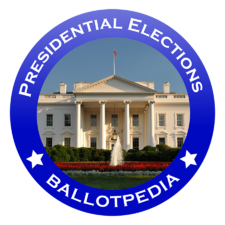Topics and participation in the CNN Republican debate (December 2015)
Ballotpedia's scope changes periodically, and this article type is no longer actively created or maintained. If you would like to help our coverage grow, consider donating to Ballotpedia.
Date: November 8, 2016 |
Winner: Donald Trump (R) Hillary Clinton (D) • Jill Stein (G) • Gary Johnson (L) • Vice presidential candidates |
Important dates • Nominating process • Ballotpedia's 2016 Battleground Poll • Polls • Debates • Presidential election by state • Ratings and scorecards |
2028 • 2024 • 2020 • 2016 Have you subscribed yet?
Join the hundreds of thousands of readers trusting Ballotpedia to keep them up to date with the latest political news. Sign up for the Daily Brew.
|
This article analyzes the central themes of the Republican presidential debate held on December 15, 2015, in Las Vegas, Nevada. The transcript prepared by The Washington Post was used to measure candidate participation and audience engagement.[1] Footage from the debate was consulted where there were ambiguities in the text.
To compare the statistics of this debate to those of the previous Republican debate, see the analysis of the FOX Business Republican debate in November 2015.
Segments
The fifth Republican presidential debate featured 17 unique discussion segments covering national security and foreign policy. These discussion segments were measured by any shift in the theme of a discussion prompted by one of the moderators: Dana Bash, Wolf Blitzer and Hugh Hewitt. Facebook users also posed questions to the candidates in video clips.
- Introduction
- Banning Muslims from entering the U.S. and ISIS strategy
- Surveillance and national security
- Censorship of the Internet
- Civilian casualties and the authorization of military force
- Ground strategy in the Middle East
- Dictatorships and regime change in the Middle East
- U.S.-Russia relations
- Qualifications to be commander-in-chief
- Pathway to citizenship and immigration reform
- Syrian refugee crisis
- U.S.-North Korea relations
- Cybersecurity
- Nuclear warfare
- Presidential temperament
- Running as an independent candidate
- Closing statements
After the candidates' introductions, moderator Wolf Blitzer explained that the focus of the debate would be the candidates' "different approaches to keeping the country safe" in the wake of "terror attacks in Paris and San Bernardino."[1] A few discussion segments also covered immigration reform and candidates' individual qualifications to make military decisions.
Overall participation
Participation in a discussion segment was defined as a substantive comment related to the discussion segment's topic. Jokes and attempts to gain permission from a moderator to speak were not considered participatory speech acts. In some instances, candidates who participated in a discussion segment diverted from the prompted topic.
The median number of discussion segments was nine. Establishing the outer bounds of participation, Donald Trump and Rand Paul participated in eleven segments and seven segments, respectively.
Candidate participation by behavior
Participation in the debate was also measured by the candidate's behavior at the start of each discussion segment. This study considered whether a candidate was initially prompted to speak during a discussion segment by a moderator or whether he or she independently engaged in the discussion segment by interrupting another candidate or calling on the moderator for permission to speak. A candidate's conduct after they joined a discussion segment was not considered.
As in the third Republican debate, Carly Fiorina attempted to interject herself into the most discussion segments. Five candidates – Ben Carson, Chris Christie, Ted Cruz, Marco Rubio and Donald Trump – only engaged in discussion segments through moderator prompting.
Candidate participation by speaking time
According to speaking time estimates from CNN, Cruz spoke nearly three minutes longer than any other candidate, talking for approximately 16.1 minutes. Bush, Fiorina, Kasich and Paul each spoke for 10 minutes or less.[2]
Candidate participation by speaking rate
Each candidate's speaking rate was calculated by dividing the total word count of the candidate's speech during the debate with his or her speaking time as measured by CNN. Although Cruz spoke two minutes more than any other candidate, he tied for the slowest speaking rate with Carson. Rubio spoke the quickest at 234 words per minute.
Candidate participation by length of prepared remarks
Each candidate was given the opportunity to offer prepared remarks at the beginning and conclusion of the debate. With 415 words in his introductory and closing statements, Rubio used nearly double the number of words that Bush and Cruz did in each of their prepared remarks.
Candidate participation by segment vs. speaking time
The amount of time a candidate spoke did not necessarily align with the number of issues he or she covered during the debate. For example, Cruz spoke longer than any other candidate, but only participated in eight discussion segments.
Audience engagement
Audience engagement was measured by noting applause, cheering, or laughter in The Washington Post's transcript. Footage from the debate was consulted when the text was ambiguous about to whom the audience was responding.
With 19 separate instances of applause and laughter, Trump received the warmest response from the crowd. Most of this audience engagement came from commentary about the temperament of his competitors. Bush was Trump's main target, receiving criticism for his "energy," "attitude," and "tough" demeanor by Trump as the audience applauded.[1]
Candidate speech analysis
|
|
|
|
|
|
|
|
|
See also
- Presidential candidates, 2016
- Presidential election, 2016/Polls
- 2016 presidential candidate ratings and scorecards
- Presidential election, 2016/Straw polls
Footnotes
| |||||||||||



















